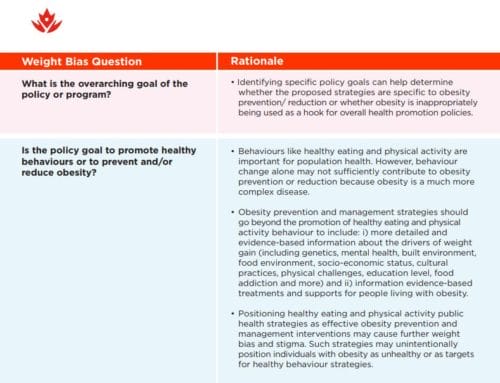Many people assume that you can tell a lot about a person’s health by simply looking at their body weight. It is also common to assume that we know some things about a person’s characteristics or their lifestyle, based on their weight. For example, we might assume that we know about a person’s eating and exercise habits. Despite the commonality of such assumptions, they are actually stereotypes about people living with obesity and are not supported by research evidence.
Researchers who examine stereotypes about people with obesity have identified a number of common stereotypes, including the belief that people with obesity are lazy, unmotivated, unintelligent, and have no willpower[1]. These researchers have found that stereotypes are common among all individuals in society, including healthcare professionals and teachers, despite a lack of scientific evidence to support such stereotypes. In reality, people come in all shapes and sizes. Our health is complex and is influenced by a broad range of factors related to our genetics, behaviour, social environment, and our physical environment. While we know that higher body weights can contribute to poor health, this is not the case for everyone who has a higher body weight[2]. Further, what is considered to be a “healthy weight” can differ between, and within, different cultures[3].
Given that researchers know how complex health is, why are stereotypes about people with obesity so common? Why do most people assume that body weight and health are the same thing? Researchers have identified social messages related to weight as being a significant source of these beliefs and stereotypes[4]. By social messages, we refer to generally accepted ways of thinking that are supported by our culture and our society. With regard to weight, researchers have identified a “healthy weight” social message in Western culture that is comprised of several interconnected parts4:
- People are responsible for maintaining their body weight
- People with lower body weights are the healthiest
- Body weight can be easily modified by making lifestyle changes, such as eating less and exercising more
In this five-part blog series, we will examine the impact of “healthy weight” social messaging on our beliefs about obesity and the impact this has on people living with obesity. The series will end with considerations for reducing the influence of these messages in our day-to-day lives.
[1] Puhl, R. M., & Heuer, C. A. (2009). The stigma of obesity: A review and update. Obesity, 17(5), 941-964. https://doi.org/10.1038/oby.2008.636
[2] Bhaskaran, K., dos-Santos-Silva, I., Leon, D. A., Douglas, I. J., & Smeeth, L. (2018). Association of BMI with overall and cause-specific mortality: A population-based cohort study of 3.6 million adults in the UK. The Lancet: Diabetes and Endocrinology, 2018(6), 944-953. https://doi.org/10.1016/S2213-8587(18)30288-2
[3] Swami, V. (2015). Cultural influences on body size ideas: Unpacking the impact of Westernization and modernization. European Psychologist, 20(1), 44-51. https://doi.org/10.1027/1016-9040/a000150
[4] Rodgers, R. F. (2016). The role of the “healthy weight” discourse in body image and eating concerns: An extension of sociocultural theory. Eating Behaviors, 22(August 2016), 194-198. https://doi.org/10.1016/j.eatbeh.2016.06.004




